WITH LISTERINE® ANTISEPTIC MOUTHRINSE, BIOFILM HAS NOWHERE TO HIDE
No matter how hard patients try to brush and floss, biofilm still hides in the saliva and deepest, darkest recesses of their mouths. If they can’t reach it, they’re left vulnerable to biofilm maturity and induced gingival inflammation. Chronic gingivitis, to some degree, affects over 90% of the world’s population.3 How many patients like this do you see in your office?
Shining a light on the evidence
In a post-hoc SITE-WISE ANALYSIS® based on a published study, brushing plus a control rinse did not provide sufficient biofilm management in the majority of sites. Using floss helped, but the greatest restoration to gingival health occurred when adding LISTERINE® Antiseptic mouthrinse.4 This scale measures the % of sites returned to health from 0-50%+. Red indicates few healthy sites and green shows 50% or more healthy sites.

The study details
Over a 6-month period among 237 healthy subjects with mild to moderate gingivitis, LISTERINE® was shown to restore health to 2x as many sites vs brushing and flossing alone.4,5
Subjects were randomized to one of three groups4:
Brushing + hydroalcohol (5%) control rinse
Brushing + flossing + hydroalcohol (5%) control rinse
Brushing + flossing + rinsing with LISTERINE® Antiseptic mouthrinse
Following a complete prophylaxis on Day 1, each subject was instructed on proper brushing, flossing, and rinsing techniques and re-educated monthly to optimize compliance. Subjects were assessed at month 0 and six months later.4
How each tooth was assessed using the Modified Gingival Index (MGI)
In a post-hoc analysis:
Mean percentage of healthy sites was calculated by taking the numbers of sites with Modified Gingival Index (MGI) scores of 0 or 1, divided by total number of sites.5
Healthy sites were those with mild (1) to no (0) inflammation, based on the MGI scores.
Modified Gingival Index (MGI) score5
Healthy sites were those with mild (1) to no (0) inflammation, based on the MGI scores.
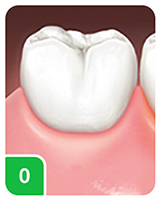
No Inflammation
Healthy
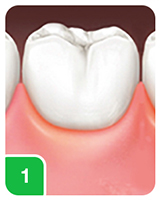
Mild Inflammation of any portion of the gingival unit (slight change in color, little change in texture)
Healthy
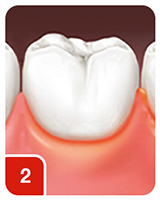
Mild Inflammation of the entire gingival unit
Unhealthy
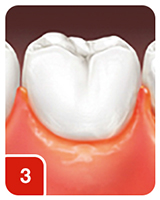
Moderate Inflammation (moderate glazing, redness, edema, and/or enlargement of the gingival unit)
Unhealthy
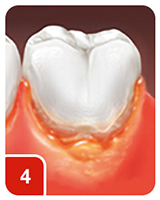
Severe Inflammation (marked redness, edema, and/or enlargement, spontaneous bleeding, or ulceration of the gingival unit)
Unhealthy
Your recommendation can help expose and eradicate biofilm
Adding LISTERINE® mouthrinse to your patients’ daily oral care routine can help restore health to sites in even the hardest to reach places of the mouth. So you can feel comfortable recommending LISTERINE® mouthrinse to patients who may still have biofilm lurking behind—even after brushing and flossing.
References:
1. Kubert D, Rubin M, Barnett ML, Vincent JW. Antiseptic mouthrinse-induced microbial cell surface alterations. Am J Dent. 1993; 6(6): 277-279.
2. Pan P, Barnett ML, Coelho J, Brogdon C, Finnegan MB. Determination of the in situ bactericidal activity of an essential oil mouthrinse using a vital stain method. J Clin Periodontol. 2000; 27(4): 256-261.
3. Coventry J, Griffiths G, Scully C, Tonetti M. ABC of oral health: periodontal disease. BMJ. 2000; 321(7252): 36-39.
4. Sharma N, Charles CH, Lynch MC, et al. Adjunctive benefit of an essential oil-containing mouthrinse in reducing plaque and gingivitis in patients who brush and floss regularly: a six-month study. J Am Dent Assoc. 2004; 135(4): 496-504.
5. Data on File, Johnson & Johnson Consumer Inc.